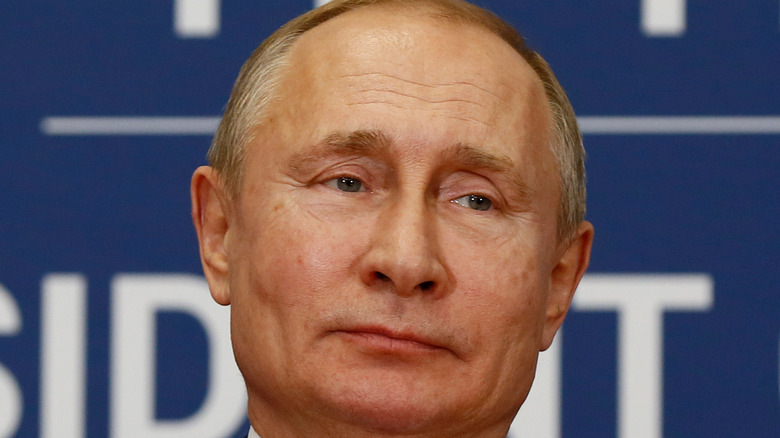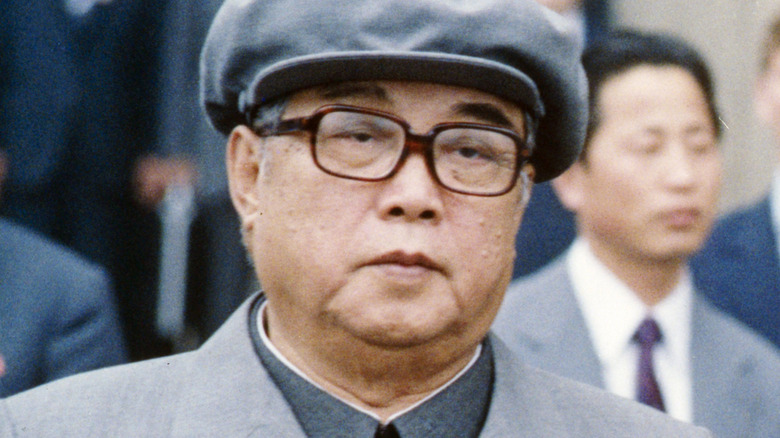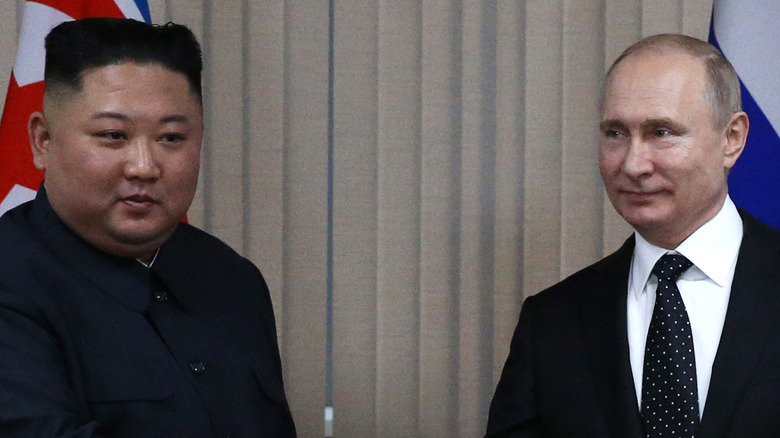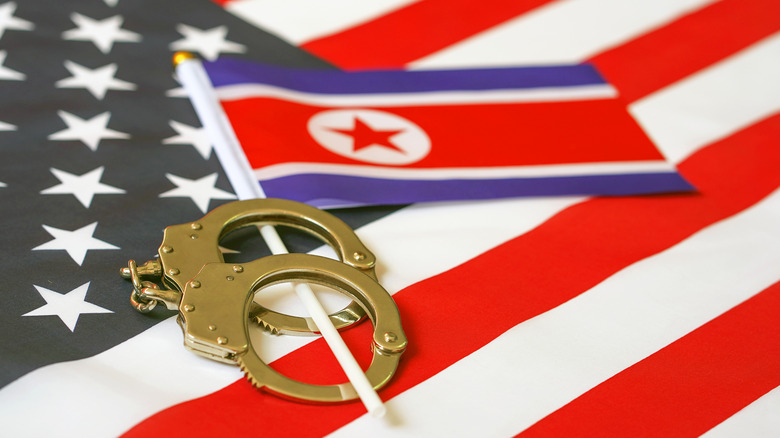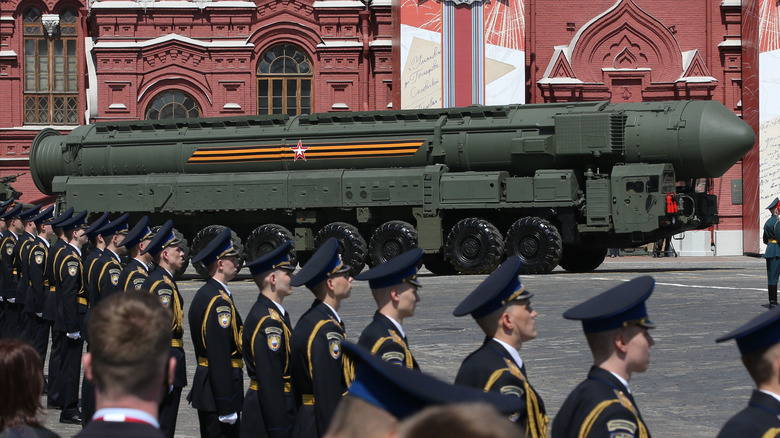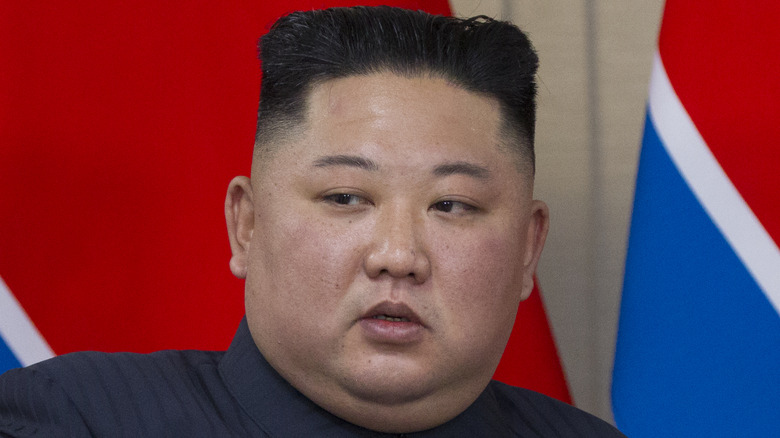Inside Vladimir Putin And Kim Jong-Un's Relationship
Despite the Russian capital city of Moscow being nearly 4,000 miles from the North Korean capital of Pyongyang, the two countries actually share a border. After all, Russia is the biggest country in the world. In the far eastern side of Russia, a small stretch of land near the port city of Vladivostok meets the northeast corner of North Korea.
This shared border dates back to before the Soviet Union as Russia first took over its present-day southeastern edge in the mid-19th century, according to WorldAtlas. At the time, the area was simply Korea, rather than the two Korean nations of today. A brutal Japanese occupation that occurred at the start of the 20th century shifted this shared border until the end of World War II. At this time, Russian involvement with Korea became more than a border, as the Soviet Union took over the northern part of the peninsula and the United States took over the southern part after Japan's surrender (via Vox).
Joseph Stalin was a mentor to Kim Il-Sung
According to a 1983 master's thesis ("North Korean Relations with China and the Soviet Union: The Impacts of Changes in the Leadership of the Two Communist Powers on North Korea," posted by Eastern Illinois University) North Korea's relationship with the Soviet Union deepened further. While still under Soviet occupation, its formal name became the Democratic People's Republic of Korea in 1948. Soviet leader Joseph Stalin saw the area of North Korea as important for Russian security in its eastern territory. With mentorship from Stalin, North Korean leader Kim Il-Sung (above) made North Korea communist. This Soviet and Chinese-backed North invaded the U.S.-backed South in 1950, sparking the Korean War. This war led to the present-day border between North and South Korea.
After Stalin's death, however, North Korea began to align itself more with the Chinese than with the Russians. In retaliation, Stalin's successor, Nikita Khrushchev, pulled back on assistance to North Korea. As North Korea attempted to be self-sufficient, it still relied on economic aid from the Chinese and the Russians throughout the 20th century. The collapse of the Soviet Union by the early 1990s resulted in the withdrawal of even more economic aid and renegotiations surrounding North Korea's debt to the Russians (via the Council on Foreign Relations).
Putin met with Kim Jong-Un in 2019
From its inception in 1948 and up to its 21st century leadership, as Vox explains, leaders of North Korea have been basically monarchical. Leadership has been passed down from Kim Il-Sung to his son Kim Jong-Il, who passed the torch to his son Kim Jong-Un. Contrary to its formal name, North Korea is not democratic.
Since Vladimir Putin's election to a third term as president of Russia in 2012, talks with North Korea have entered a new phase. Putin did not meet with Kim Jong-Un until 2019. Kim's meeting with U.S. President Donald Trump in 2018 preceded this, and perhaps spurred Kim's meeting with Putin and with China's Xi Xinping. Doug Bandow of The National Interest explains that this meeting with Putin was "mostly symbolic." However, Russia holds veto power in the United Nations regarding sanctions on the Koreans and opposes North Korea's nuclear build-up. Nevertheless, the capital of Pyongyang could eventually possess more than a hundred nukes.
The United States has economic sanctions against North Korea
Though the meeting between President Vladimir Putin and Kim Jong-Un was only for a few hours in 2019, the two leaders had a champagne toast and seemed friendly (via The Guardian). Kim likely hoped to get economic support from Russia, given that most support was still only from China and that the United States had long-standing economic sanctions on North Korea. Even Kim's meeting with President Trump in Hanoi did not offer much optimism for an end to U.S. attempts to keep North Korea isolated (via 38 North).
A key topic at Putin's meeting with Kim was the international sanctions imposed upon North Korea. The Council on Foreign Relations stated that Putin did not suggest any weakening of these sanctions, as Russia serves a significant role in the U.N.'s decisions regarding them. Despite this, Russia has violated some of the sanction agreements by shipping North Korean coal, oil, and petroleum exports to other countries and allowing North Koreans to work in Russia. Allowing them to work in Russia violates the sanctions because the sanctions prohibit North Koreans from earning any foreign currency.
Russia has nuclear weapons of its own
Denuclearization was another significant topic in the meeting, a topic that Vladimir Putin and the United States both support. Putin's stance on denuclearization contrasted with the fears held by some in the United States that Putin might try to use the summit to complicate the American efforts to push North Korea to denuclearize. In reality, Russia would prefer to eliminate the possibility for conflict so close by. Keeping North Korea from creating nuclear weapons also prevents competition for Russia's own nuclear arsenal as explained by Artyom Lukin for 38 North.
Other than denuclearization, Putin had few pressing issues to take into this meeting, seeking only to perhaps reestablish Russia's role as a major player on the Korean Peninsula. In the years leading up to the meeting, China and the U.S. have had more influence on North Korea, the former being in assistance with oil supplies and the latter being in formal lack of assistance in the form of its economic sanctions.
Putin and Kim Jong-Un have only met once
After the meeting, Vladimir Putin stated that he and Kim Jong-Un discussed "prospects for developing bilateral ties." As for a final word on nuclear weaponry, Putin said that leader Kim Jong-un would require "security guarantees" in order to get rid of his nuclear projects. The two did not announce any agreements, but the overall tone was more friendly than that of Kim's 2018 meeting with President Donald Trump. No agreements were made with that meeting, either (via The Guardian).
Perhaps the 2019 summit served only to create the appearance of a friendly relationship, because as of 2022, it has been the only meeting between Putin and Kim. U.S. envoy for North Korea policy Sung Kim and Russian vice foreign minister Igor Morgulov both had separate talks with South Korea counterpart Noh Kyu-duk in August of 2021 but there were no meetings between any North Korean representatives and American ones. Around the same time, Russia discussed the need for multilateral conversations surrounding nuclear power (per The National Interest), suggesting that North Korea has remained in the conscience of Putin.
